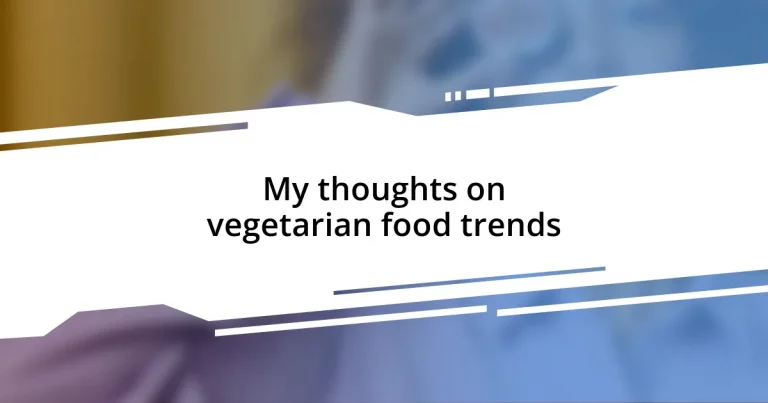Key takeaways:
- The rise of innovative plant-based proteins like jackfruit and legumes is transforming vegetarian cuisine, offering satisfying alternatives to traditional meat.
- Fermented foods and meal kits for vegetarian diets are gaining popularity, enhancing gut health and simplifying meal preparation for busy individuals.
- Vegetarianism is linked to numerous health benefits, including lower blood pressure, improved digestion, and reduced risk of chronic diseases.
- Future trends indicate a growing demand for gourmet vegetarian options and increased awareness of the environmental impact of food choices.
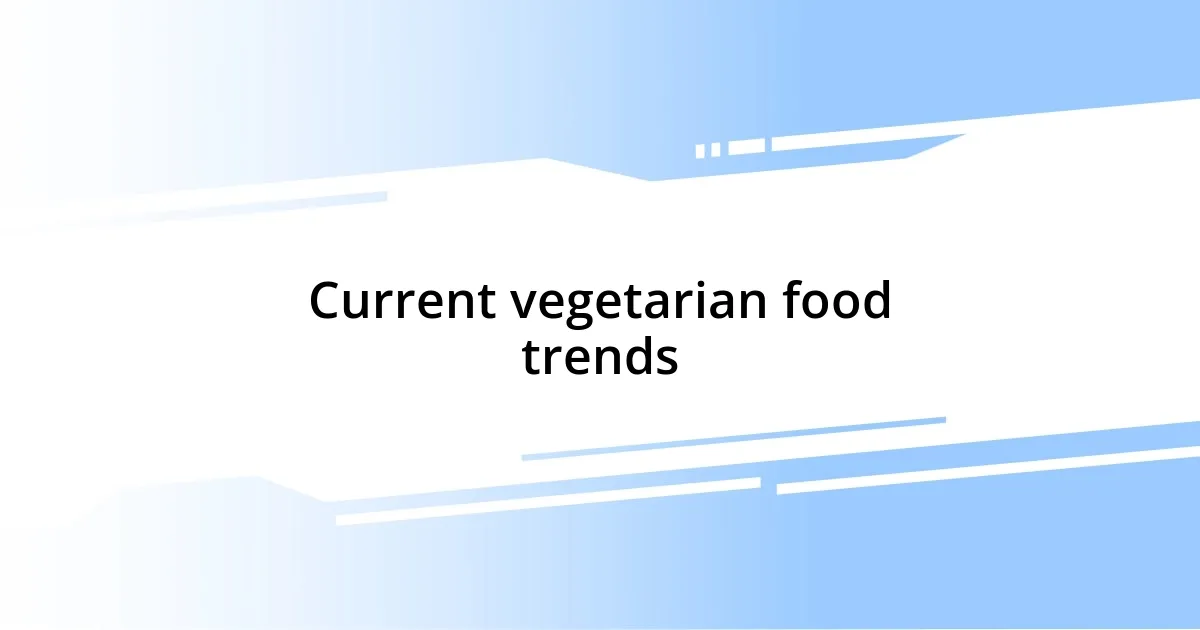
Current vegetarian food trends
One of the most exciting trends in vegetarian food right now is the surge of innovative plant-based proteins. I remember the first time I tried a jackfruit taco—my taste buds were blown away! How can something so versatile mimic the texture of pulled meat so well? It’s fascinating to see how chefs are creatively transforming ingredients like chickpeas, lentils, and tempeh into dishes that are not only satisfying but also bursting with flavor.
Fermented foods are also making waves in vegetarian cuisine. Think about it: kimchi, sauerkraut, and kombucha are not just trendy; they’re packed with probiotics that are great for gut health. I once experimented with making my own kimchi at home, and while it was a bit of a messy adventure, the satisfaction of diving into that crunchy, spicy goodness was worth every drop of spilled brine. Do you think the health benefits are boosting the popularity of these foods?
Another current trend I’ve noticed is the rise in meal kits that cater exclusively to vegetarian diets. It’s such a game changer for busy individuals who want more plant-based options without the hassle of planning. I often find myself recommending these kits to friends who are looking to explore vegetarian meals but feel overwhelmed by the grocery store—a simple solution that opens the door to a world of flavors and creativity in the kitchen. Have you tried any of these meal kits lately?
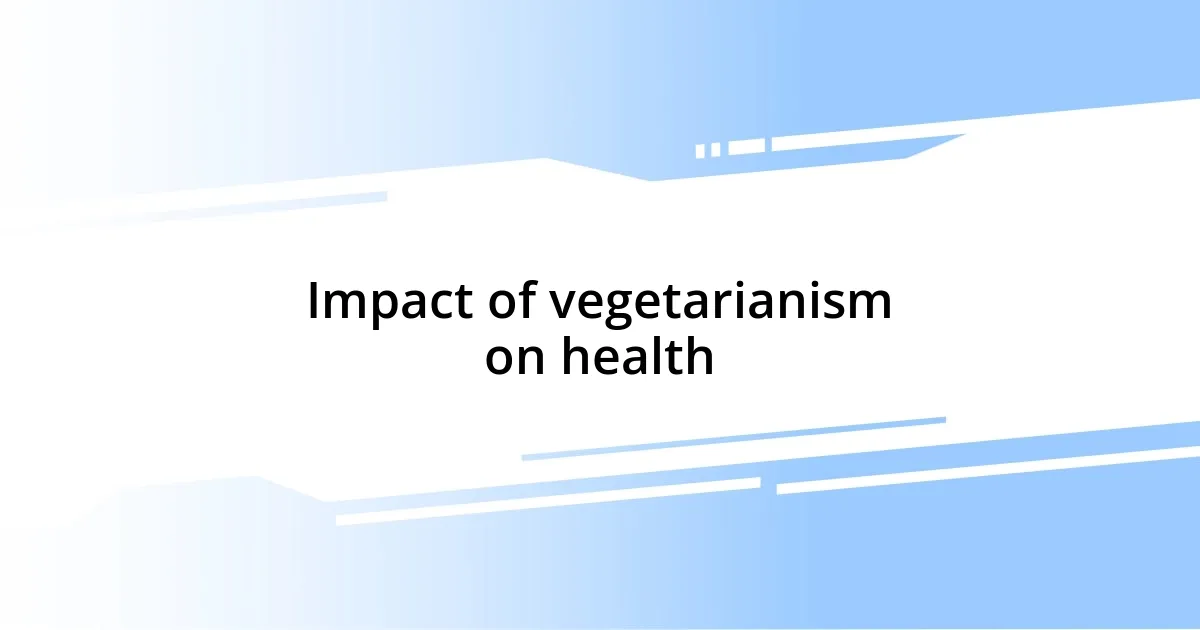
Impact of vegetarianism on health
The impact of vegetarianism on health is profound and multifaceted. From my experience, adopting a vegetarian diet has not only helped me feel more energetic but has also led to a notable decrease in my cholesterol levels. Many share similar health transformations; it’s impressive how reducing meat consumption can promote heart health and lower the risk of chronic diseases.
Here are some specific health benefits linked to vegetarianism:
- Lower Blood Pressure: Many studies indicate that vegetarians often have lower blood pressure levels, contributing to overall cardiovascular health.
- Weight Management: A plant-based diet can be lower in calories, making it easier to maintain a healthy weight without feeling deprived.
- Improved Digestion: The increased fiber intake from fruits, vegetables, and whole grains aids digestion and promotes a healthy gut.
- Reduced Risk of Chronic Diseases: Research suggests that a vegetarian diet can decrease the risk of type 2 diabetes and certain cancers.
- Enhanced Mood and Mental Clarity: Personally, I’ve noticed my mood and focus improve, likely due to the abundance of nutrients found in plant foods.
Transitioning to vegetarianism has been a journey for many, including myself. I recall feeling lighter and more vibrant after eliminating meat from my diet. Those initial weeks were challenging, sure—it took adjusting to new ways of cooking and thinking about meals. But with each plant-based dish I explored, I felt a newfound appreciation for the diverse flavors and health benefits that come with a vegetarian lifestyle.
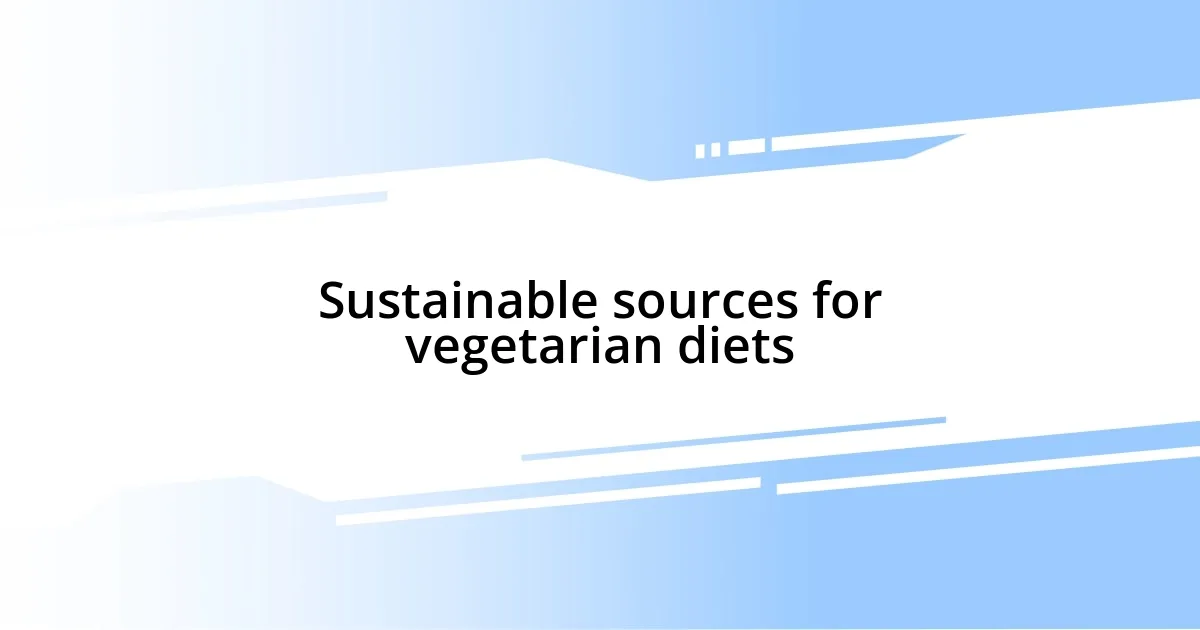
Sustainable sources for vegetarian diets
Sustainable sources for vegetarian diets are crucial for both health and the environment. I often think about how my food choices impact the planet. For instance, locally sourced vegetables not only taste fresher but support local farmers and reduce carbon emissions tied to transportation. On my weekend trips to the farmer’s market, I relish picking up seasonal produce—it feels good knowing I’m contributing to sustainability while enjoying the vibrant colors of fresh veggies. Do you visit local markets too?
Another sustainable option worth exploring is legume cultivation. Legumes, like beans and lentils, are nitrogen-fixing plants, meaning they help enhance soil quality while providing essential proteins for a vegetarian diet. From my experience, incorporating legumes into my meals has not only increased my protein intake but also added a delightful variety to my dishes. I still remember the first time I made a hearty lentil soup; it was a comforting bowl that left me feeling both nourished and content.
In addition, incorporating nuts and seeds can contribute significantly to a sustainable vegetarian diet. These foods require less water than many crops and can be grown in various climates. I love tossing a handful of walnuts into my salads, adding richness and crunch, all while knowing I’m making a mindful choice. With the growing trends in sustainable farming practices, the options are expanding, allowing us to indulge while remaining eco-conscious.
| Source | Sustainability Benefit |
|---|---|
| Locally Sourced Vegetables | Supports local economy, reduces carbon footprint. |
| Legumes | Enhances soil quality, high protein source. |
| Nuts and Seeds | Lower water requirements, adaptable to various climates. |
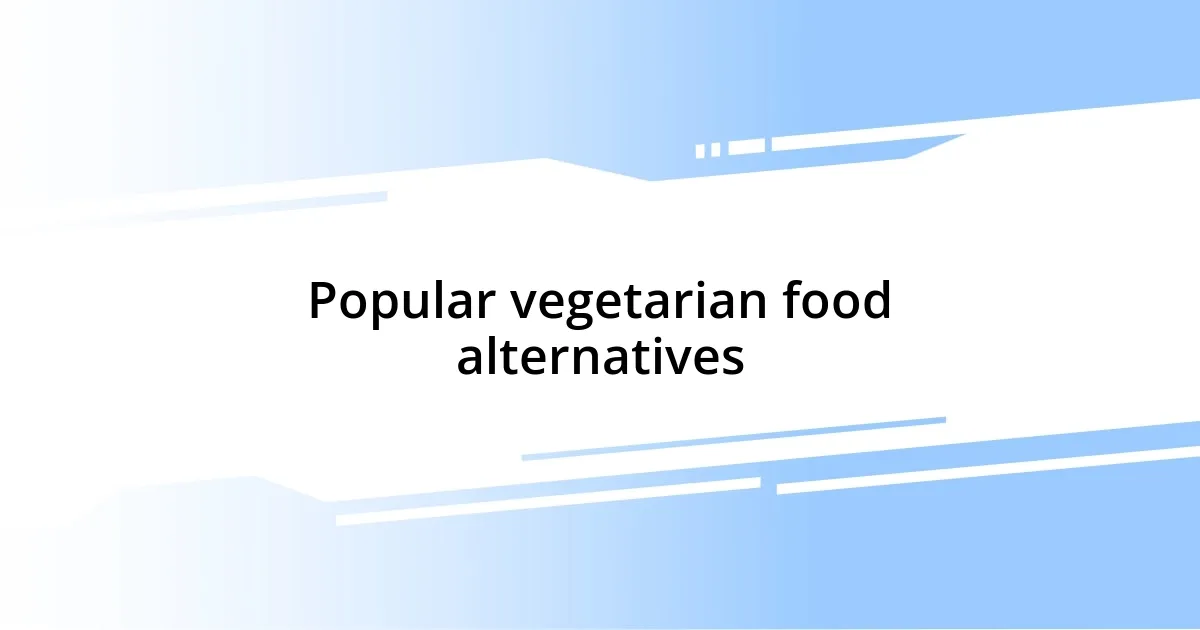
Popular vegetarian food alternatives
When I think about popular vegetarian food alternatives, tofu often comes to mind. I was initially skeptical about it, wondering if it could really be a satisfying substitute. But once I experimented with marinating it in my favorite sauces and grilling it, I discovered a hearty texture that absorbs flavors beautifully. Have you tried it too? It can transform an ordinary stir-fry into a savory delight.
Another standout in the realm of vegetarian alternatives is jackfruit. It’s fascinating how a single fruit can mimic the texture of pulled pork so well. I had my first taste of jackfruit tacos at a food festival, and it was a game changer. The sweet and savory notes created a harmony that I never expected. Have you experienced that moment when you realize a plant-based option can deliver the same satisfaction as traditional meat?
Of course, there’s the growing popularity of plant-based meats, like those from Beyond Meat and Impossible Foods. These products have truly come a long way in replicating the taste and mouthfeel of meat, a feat that surprised me the first time I tried a plant-based burger. I still can’t believe how close it was to the real deal! This trend offers an intriguing option for those dabbling in vegetarianism, making the transition less daunting and more enjoyable. It’s exciting to see how these alternatives are evolving, isn’t it?
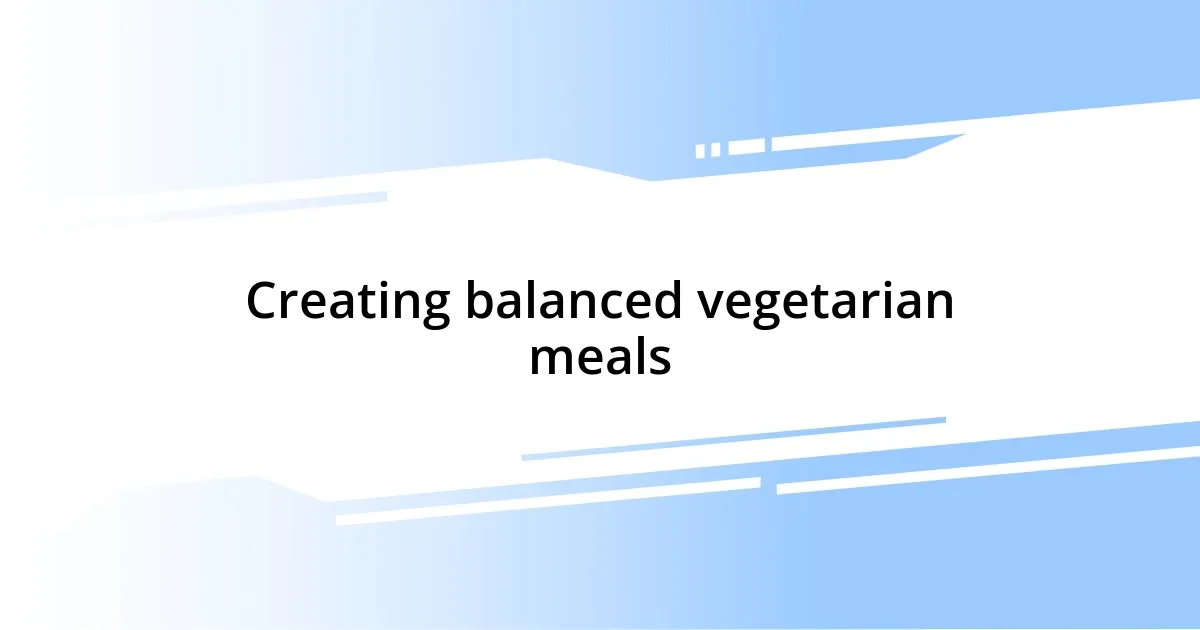
Creating balanced vegetarian meals
Creating balanced vegetarian meals often requires a thoughtful approach to ensure you’re getting all the necessary nutrients. I know firsthand how easy it is to focus solely on vegetables and forget about protein. For instance, I once made a salad that was bursting with colors and flavors but left me feeling a bit empty afterward. That’s when I realized the importance of pairing my greens with sources of protein like chickpeas or quinoa. Have you ever had a meal that looked great but didn’t quite satisfy? It’s these experiences that inform our choices.
I particularly enjoy combining diverse food groups to create nutritionally rich dishes. One of my favorites is a Buddha bowl, which I fill with a mix of roasted veggies, brown rice, avocado, and a drizzle of tahini. It not only tastes fantastic, but the variety ensures I’m fueling my body with proteins, healthy fats, and fibers. How do you approach building your meals? I think the art lies in experimenting with flavors and textures, making it an enjoyable venture rather than a chore.
A good rule of thumb is to strive for a colorful plate. The vibrant colors of fruits and vegetables often indicate different vitamins and minerals, which our bodies need. I learned this when I started incorporating purple cabbage, orange carrots, and red bell peppers into my meals. Each addition provided a unique crunch and brought a delightful spectrum of nutrients. Plus, it transformed simple meals into visually appealing creations that are truly a feast for the eyes. Have you embraced this colorful philosophy in your cooking routine? I highly recommend it for both the aesthetics and the health benefits.
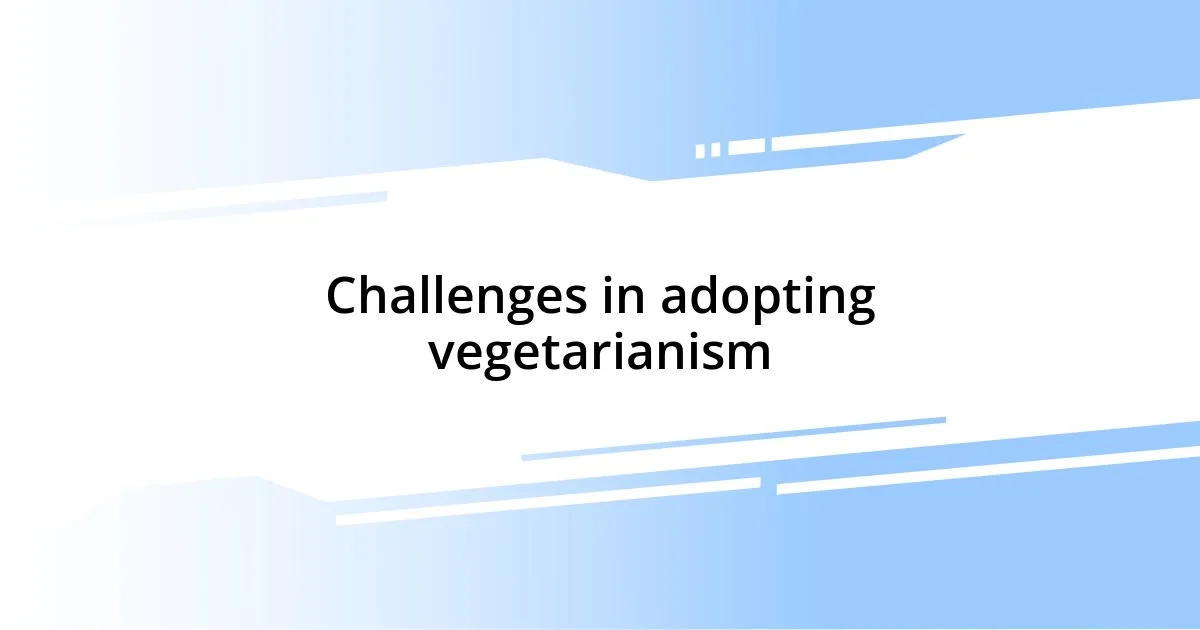
Challenges in adopting vegetarianism
Adopting vegetarianism isn’t just about eliminating meat; it often comes with a mix of social and cultural challenges. I remember feeling out of place during a family gathering when everyone else was enjoying barbecued chicken while I picked at my veggie skewers. It made me question my choice and wonder if I’d ever fully integrate vegetarianism into my lifestyle. How do you handle similar situations? I found that open conversations about my food choices helped bridge the gap and made those around me more supportive.
Another hurdle lies in meal planning and preparation. I often felt overwhelmed by the sheer variety of plant-based ingredients available. One time, I tried to whip up a vegetarian curry with an intricate list of spices and vegetables, only to find myself lost in the process. It taught me the importance of keeping it simple, especially when I’m short on time. Have you also faced the dilemma of wanting to explore new recipes but feeling daunted by the complexity? I’ve found that starting with familiar flavors can build confidence in the kitchen.
Nutritional concerns can also play a big role in the decision to go vegetarian. Initially, I was worried about missing out on essential nutrients like protein and iron. I vividly recall a moment when I felt sluggish after not paying attention to my dietary balance. It made me realize that being vegetarian doesn’t automatically mean healthy. It’s crucial to educate ourselves and stay intentional about our dietary choices. Have you dived into understanding plant-based nutrition? I’ve started to thrive on resources that emphasize well-rounded meals, and it has transformed my approach.

Future predictions for vegetarian trends
As I look to the future of vegetarian food trends, I anticipate a surge in innovative plant-based proteins. Recently, I tried a vegan burger made from pea protein, and it blew me away! Have you explored alternatives to traditional meat products? I believe this shift will not only cater to the growing demand for sustainable diets but also introduce exciting flavors and textures that can satisfy even the most ardent meat lovers.
I also foresee an increase in the availability of gourmet vegetarian dining options. Just a few weeks ago, I dined at a local restaurant that offered a five-course vegetarian tasting menu. Each dish was meticulously crafted, and I felt like I was attending a culinary event rather than just a meal. Have you experienced something similar? I think as chefs become more adventurous with plant-based cuisines, we’ll see a delightful intersection of creativity and health-consciousness on our plates.
Moreover, I predict that greater awareness of environmental issues will further propel vegetarianism into the mainstream. Reflecting on my journey, I remember when I first learned about the impact of meat consumption on climate change; it was a pivotal moment for me. As more individuals connect their dietary choices to environmental sustainability, I believe we’ll see an even more vibrant community advocating for vegetarian lifestyles. Isn’t it inspiring to think about how our food choices can contribute to a healthier planet?












